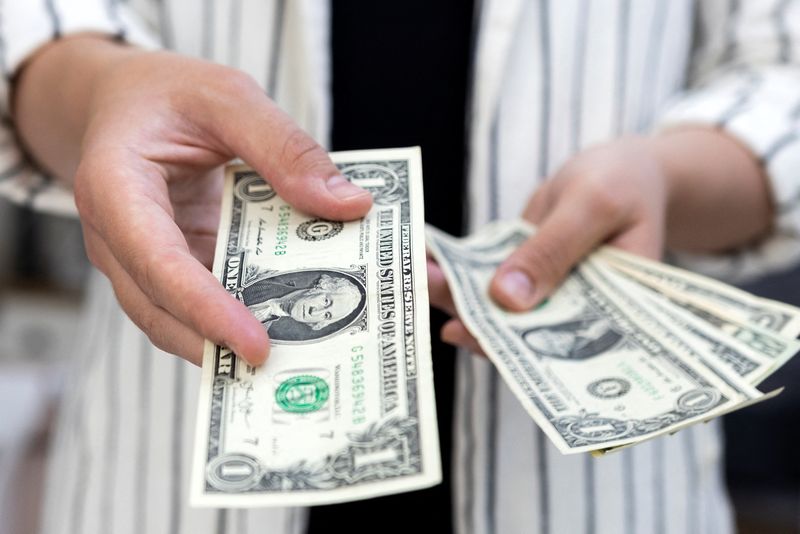 © Reuters. Woman holds U.S. dollar banknotes in this illustration taken May 30, 2022. REUTERS/Dado Ruvic/Illustration/Files
© Reuters. Woman holds U.S. dollar banknotes in this illustration taken May 30, 2022. REUTERS/Dado Ruvic/Illustration/Files
By Kevin Buckland
TOKYO (Reuters) - The dollar continued its overnight rally into Asian trading hours on Tuesday, hitting fresh two-decade highs versus the yen, as worries about persistent inflation pushed up U.S. bond yields.
The greenback also edged higher versus the euro, sterling and Swiss franc. It crept up, too, versus the Australian dollar, with the market split on whether the country's central bank will hike Australia's key interest rate later in the day by a quarter point or opt for something bigger.
The Aussie weakened 0.15% to $0.7183, continuing its retreat from a six-week peak at $0.72825 reached last Friday.
The dollar pushed as high as 132.305 yen on Tuesday - a level not seen since April 2002 - buoyed by the 10-year Treasury yield's rise to 3.05% for the first time in nearly four weeks. The currency pair last traded 0.17% higher at 132.12.
By contrast, equivalent Japanese yields are pinned near zero by the Bank of Japan's yield curve control policy, with central bank governor Haruhiko Kuroda on Monday reiterating an unwavering commitment to "powerful" monetary stimulus.
Commonwealth Bank of Australia (OTC:CMWAY) blames not just yield differentials, but also Japan's reliance on energy imports for the yen's weakness, although it doesn't expect much more depreciation from here.
"We consider JPY will continue to benefit from safe haven flows so long as Japan's current account remains in surplus," CBA strategist Carol Kong wrote in a note to clients.
"As such, we do not anticipate a repeat of the rapid USD/JPY appreciation seen in March and April," and instead expect the dollar to consolidate near the top of its recent 126-131 yen range, she said.
Strong U.S. jobs data at the end of last week have fuelled bets that upward price pressures will be around for longer, potentially forcing more aggressive action from the Federal Reserve.
Consumer price figures due Friday will provide more clues on the Fed's rate-hiking path, ahead of next week's policy decision, where a half-point increase is widely expected.
"Friday's inflation report will likely show that inflation is not easing just yet, but that the odds of a recession are still low," Edward Moya, senior market analyst at OANDA, wrote in a note.
"Wall Street will need to wait for a couple more inflation reports after this one before anyone can confidently make a call as to when the Fed may alter their tightening course."
The dollar index - which measures the currency against six major peers - ticked up 0.04% to 102.51, extending Monday's 0.26% advance.
The euro slipped 0.09% to $1.0686 ahead of the European Central Bank's rate-setting meeting on Thursday, with traders, who have already priced in several hikes and the end of bond-buying stimulus, wanting more clarity on what comes after.
Sterling edged 0.04% lower to $1.2523. It gained 0.29% in the previous session, as Prime Minister Boris Johnson survived a vote of no confidence but was left weakened.
The dollar added 0.11% to 0.97125 Swiss francs.

